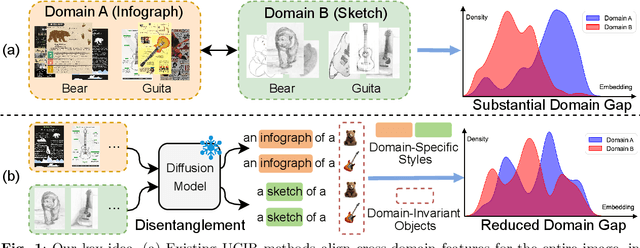Ruohong Yang
DUDE: Diffusion-Based Unsupervised Cross-Domain Image Retrieval
Sep 04, 2025



Abstract:Unsupervised cross-domain image retrieval (UCIR) aims to retrieve images of the same category across diverse domains without relying on annotations. Existing UCIR methods, which align cross-domain features for the entire image, often struggle with the domain gap, as the object features critical for retrieval are frequently entangled with domain-specific styles. To address this challenge, we propose DUDE, a novel UCIR method building upon feature disentanglement. In brief, DUDE leverages a text-to-image generative model to disentangle object features from domain-specific styles, thus facilitating semantical image retrieval. To further achieve reliable alignment of the disentangled object features, DUDE aligns mutual neighbors from within domains to across domains in a progressive manner. Extensive experiments demonstrate that DUDE achieves state-of-the-art performance across three benchmark datasets over 13 domains. The code will be released.
DiFiC: Your Diffusion Model Holds the Secret to Fine-Grained Clustering
Dec 25, 2024



Abstract:Fine-grained clustering is a practical yet challenging task, whose essence lies in capturing the subtle differences between instances of different classes. Such subtle differences can be easily disrupted by data augmentation or be overwhelmed by redundant information in data, leading to significant performance degradation for existing clustering methods. In this work, we introduce DiFiC a fine-grained clustering method building upon the conditional diffusion model. Distinct from existing works that focus on extracting discriminative features from images, DiFiC resorts to deducing the textual conditions used for image generation. To distill more precise and clustering-favorable object semantics, DiFiC further regularizes the diffusion target and guides the distillation process utilizing neighborhood similarity. Extensive experiments demonstrate that DiFiC outperforms both state-of-the-art discriminative and generative clustering methods on four fine-grained image clustering benchmarks. We hope the success of DiFiC will inspire future research to unlock the potential of diffusion models in tasks beyond generation. The code will be released.
 Add to Chrome
Add to Chrome Add to Firefox
Add to Firefox Add to Edge
Add to Edge